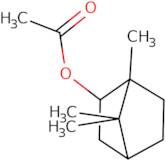Información del producto
- (-)-Borneol acetate
- (-)-Bornyl acetate
- (1R,2R,4R)-1,7,7-trimethylbicyclo[2.2.1]hept-2-yl acetate
- (1R,2S,4R)-1,7,7-trimethylbicyclo[2.2.1]hept-2-yl acetate
- (1S)-1,7,7-Trimethylbicyclo[2.2.1]-2-heptanol acetate
- (1S,2R,4S)-1,7,7-trimethylbicyclo[2.2.1]hept-2-yl acetate
- (1S-endo)-1,7,7-Trimethylbicyclo[2.2.1]heptan-2-yl acetate
- 1S-endo-Bornyl acetate
- Bicyclo(2.2.1)heptan-2-ol, 1,7,7-trimethyl-, 2-acetate, (1S,2R,4S)-
- Bicyclo(2.2.1)heptan-2-ol, 1,7,7-trimethyl-, acetate, (1S,2R,4S)-
- Ver más sinónimos
- Bicyclo[2.2.1]heptan-2-ol, 1,7,7-trimethyl-, acetate, (1S-endo)-
- Borneol, acetate, (1S,2R,4S)-(-)-
- Borneol, l-, acetate
- Einecs 227-101-4
- l-Bornyl acetate
- levo-Bornyl acetate
Bornyl acetate is a natural compound that belongs to the group of alkanoic acids. It has been shown to have anti-infective properties, and can be used as an additive in food products. Bornyl acetate interacts with the citric acid cycle, inhibiting glycol ether production. This may be due to its hydroxyl group, which is responsible for its interaction with the citric acid cycle. Bornyl acetate has been shown to interact with geranyl and bornyl compounds in a way that leads to the formation of terpenes, which are natural compounds. It also inhibits protein synthesis by interacting with the enzyme fatty acid synthase. Bornyl acetate has been shown in molecular docking analysis to bind to dna gyrase and topoisomerase IV, leading to inhibition of bacterial replication.





